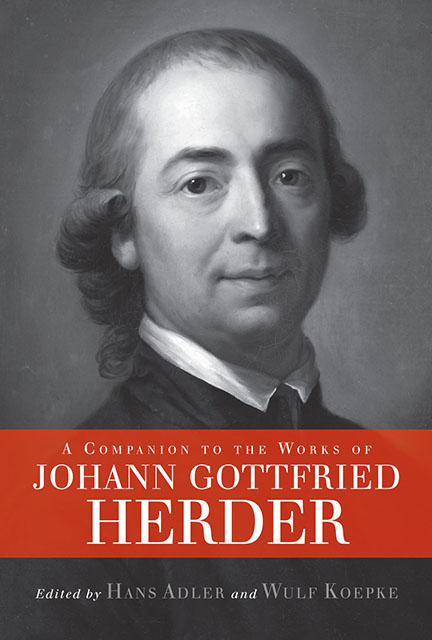Book contents
- Frontmatter
- Contents
- Acknowledgments
- List of Abbreviations
- Introduction
- 1 Herder's Life and Works
- 2 Herder's Epistemology
- 3 Herder and Historical Metanarrative: What's Philosophical about History?
- 4 Herder's Concept of Humanität
- 5 Herder and Language
- 6 Herder's Aesthetics and Poetics
- 7 Myth, Mythology, New Mythology
- 8 Particular Universals: Herder on National Literature, Popular Literature, and World Literature
- 9 Herder's Views on the Germans and Their Future Literature
- 10 Herder's Biblical Studies
- 11 Herder's Theology
- 12 Herder and Politics
- 13 Herder's Poetic Works, His Translations, and His Views on Poetry
- 14 Herder's Style
- 15 Herder as Critical Contemporary
- 16 Herder in Office: His Duties as Superintendent of Schools
- 17 Herder's Reception and Influence
- Bibliography
- Notes on the Contributors
- Index
1 - Herder's Life and Works
Published online by Cambridge University Press: 28 February 2023
- Frontmatter
- Contents
- Acknowledgments
- List of Abbreviations
- Introduction
- 1 Herder's Life and Works
- 2 Herder's Epistemology
- 3 Herder and Historical Metanarrative: What's Philosophical about History?
- 4 Herder's Concept of Humanität
- 5 Herder and Language
- 6 Herder's Aesthetics and Poetics
- 7 Myth, Mythology, New Mythology
- 8 Particular Universals: Herder on National Literature, Popular Literature, and World Literature
- 9 Herder's Views on the Germans and Their Future Literature
- 10 Herder's Biblical Studies
- 11 Herder's Theology
- 12 Herder and Politics
- 13 Herder's Poetic Works, His Translations, and His Views on Poetry
- 14 Herder's Style
- 15 Herder as Critical Contemporary
- 16 Herder in Office: His Duties as Superintendent of Schools
- 17 Herder's Reception and Influence
- Bibliography
- Notes on the Contributors
- Index
Summary
“Licht, Liebe, Leben”
— a favorite saying of Herder’sJOHANN GOTTFRIED HERDER (1744–1803) was born into a family of modest means in the German-speaking town of Mohrungen in East Prussia (today Morąg in Poland) on 25 August 1744. Both his grandfather, Christoph (1681–1750), and his father, Gottfried (1706–63), were master weavers. His father was forced to supplement his trade by working as a sexton, choirmaster, and instructor for girls at the local Lutheran congregation. Jakob Peltz, Anna Elisabeth's father, was quite successful as a master shoemaker. Herder recalled that his father was strict and just but equally good-natured, and he was good to his children. Johann Gottfried and Catharina Dorothea (1748–93) wrote that their mother was sensitive and tender, a characteristic that mellowed their father's serious disposition.
Mohrungen
Johann Gottfried's early education was shaped largely by the weak economic position of his hometown, his father's mentoring, Lutheran worship services, and, also, his mother’s, Anna Elisabeth Herder's (Peltz’s) (1717–72), religious instruction in pietism. Herder's early thinking was impacted by Johann Arndt's (1555–1621) influential work of mysticism, Vier Bücher vom wahren Christentum (Four Books on True Christianity, 1606–10), his father's favorite book. Late seventeenth-and early eighteenth-century German Pietists, who were well familiar with Arndt's book, cultivated their spirituality in a personal relationship to God rather than the institution and religion of the church as such. For his part, however, Herder would incorporate the exercise of sound reason into his spiritual experience, thus avoiding the irrational extremes of pietism. By virtue of his upbringing and early formal education, Herder began to develop a keen sense of the potential and future development of humanity, which he then cultivated in his occupations as administrator, writer, preacher, traveler, and family man. His primary calling, however, was to the ministry.
The entrance to the St. Peter and Paul Church in Mohrungen with its mysterious gothic vault caused the boy to shudder at times. He was overpowered by a feeling of sublimity that Wilhelm Dobbek believes sparked Herder's spiritual Wendung, a turn that strengthened his faith and sense of purpose in life. In this pietistic congregation there was a sense of equality among the “brothers” and “sisters” of the faith that carried over to Herder’s later understanding of the nature of community life.
- Type
- Chapter
- Information
- A Companion to the Works of Johann Gottfried Herder , pp. 15 - 42Publisher: Boydell & BrewerPrint publication year: 2009
- 2
- Cited by



